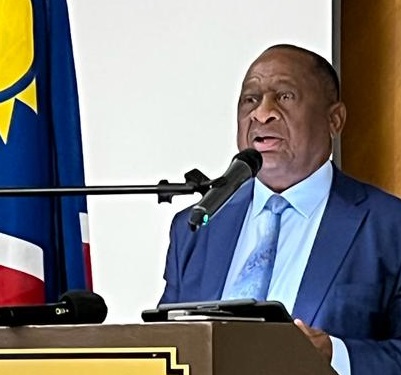
Health Ministry launches National Medicines Policy

The Ministry of Health and Social Services (MoHSS) recently revised and launched the National Medicines Policy, which provides strategic guidance on medicines development, production, regulation, selection, and rational use of medicines.
This comes as the Minister of Health and Social Services, Dr. Kalumbi Shangula, said the reported stock of critical and other pharmaceuticals at health facilities is still an area of concern for the ministry, indicating that particularly certain medicines for chronic conditions.
Shangula said this during the official opening of the National Management Development Forum in Windhoek on Monday. Additionally, he said a committee was established to develop a Medicines Pricing Policy in Namibia.
“The Medicines Pricing Policy aims at establishing robust financing and pricing mechanisms that ensure equitable access to essential medicines at the lowest possible cost. Notwithstanding these achievements, it is important to adequately address issues about quantification and forecasting of medicines and pharmaceutical supplies; securing multi-year procurement contracts; pooled procurement, integration of SYSPRO and Integrated Financial Management System; and the full implementation of the Central Medical Stores Turnaround Strategy,” Shangula said.
He further acknowledged the fact that a three-year quantification exercise for pharmaceuticals has been completed. This will allow for a robust and well-planned guide and process for the procurement and distribution of pharmaceuticals in the country over the next three years, according to the minister.
Furthermore, Shangula said he had taken note of the steady progress made in creating capacity for the implementation of the Performance Management System (PMS) and thus issued directions to the Office of the Executive Director to continue to take a leading role in ensuring the execution of PMS.
According to him, the cabinet approved a policy on the implementation of PMS in the ministry, which seeks to foster a culture of results, efficiency, and accountability in service delivery.
Meanwhile, Shangula called on stakeholders in the health sector to redouble their efforts in fulfilling their collective and shared mandate of providing quality health and social welfare services for communities.” I am excited and am looking forward to continuing engagement with our health partners to address the challenges I have highlighted,” he added.
However, the minister said he was worried about the aging health infrastructure countrywide and highlighted that, consequently, the ministry continues with its programme of developing and renovating public healthcare infrastructure.
According to the minister, the number of facilities upgraded/constructed by the ministry since 2017 includes 17 clinics, one health centre staff accommodation, 23 hospital components, and 21 prefabricated isolation facilities.
He also said other projects entail oxidation ponds at Andara and asbestos demolition at Oshakati Intermediate Hospital.
He highlighted the importance of prioritizing the finalization of the Policy Framework on Universal Health Coverage, Health in All-Policies, National Health Policy Framework, and National Medicines Policy.
He added: “These frameworks are vital instruments for ensuring that people have access to the health care they need without suffering financial hardship and that promotion of health is everybody’s responsibility.
It is through these instruments that inter-sectoral collaboration and synergies are rolled out to bring about the quality of life in our communities. The involvement of key stakeholders in these processes is very critical. Hence, I call on your respective offices and organizations to partner with the ministry in undertaking the successful completion of these frameworks.”














































